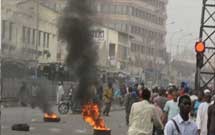 North African jihadist group al Qaeda in the Islamic Maghreb, or AQIM, appears to be taking precautionary measures ahead of the impending military intervention in northern Mali. On Oct. 22, French and Malian media reports indicated that AQIM already has recruited hundreds of foreign fighters, including 150 Sudanese and Sahrawis, to augment its ranks. A spokesman for Ansar Dine, an ethnic Tuareg militant proxy for AQIM, denied
North African jihadist group al Qaeda in the Islamic Maghreb, or AQIM, appears to be taking precautionary measures ahead of the impending military intervention in northern Mali. On Oct. 22, French and Malian media reports indicated that AQIM already has recruited hundreds of foreign fighters, including 150 Sudanese and Sahrawis, to augment its ranks. A spokesman for Ansar Dine, an ethnic Tuareg militant proxy for AQIM, denied
these claims and accused the French government of spreading disinformation. But as Malian, regional and international officials plan for the military intervention, so too may the al Qaeda franchise group.
Analysis
The reports claimed that roughly 150 fighters have been deployed to each of the Malian cities of Timbuktu and Gao. That number corresponds to the number of fighters in an AQIM "qatiba," often translated as brigade. More akin to a company in Western military parlance, these brigades are accompanied by some 10 armed pickup trucks used for rapid transport and combat.
AQIM is loosely organized, and the group's overall leader, Abu Musab Abd al-Wadoud, often commands associated brigades from a stronghold in Algeria's Kabylie region. While they work with AQIM, brigades are granted a fair amount of autonomy in terms of target selection, and they operate in overlapping areas of responsibility.
In northern Mali, AQIM has worked with several key brigades and smaller units. Among these groups are the al-Furqan brigade, stationed in Timbuktu and led by AQIM emir in the Sahel Yahia Djouadi; and the Taregh Ibn Ziyad brigade, led by Hamid Essoufi and allegedly stationed in Gao.
Another notable brigade is the el Moulathamoune brigade, which until Oct. 12 had been led by Khalid Abu al-Abbas, aka Mokhtar Belmokhtar. Al-Wadoud reportedly demoted Belmokhtar on Oct. 12 following disagreements over AQIM policies. In his demotion, Belmokhtar probably is operating in a smaller unit with a narrower geographic scope. Reports indicate that he is operating along the Mali-Mauritania border and that his presence in the area is a contentious issue within AQIM.
Losing the Advantage?
In the context of Belmokhtar's demotion, introducing two brigades of foreign fighters to Timbuktu and Gao reveals several things about AQIM. First, bringing in some 300 auxiliary forces shows that the group's efforts to recruit Malians have been ineffective. AQIM understands that it may soon have to contend with a military intervention force comprising as many as 6,000 soldiers from Mali, West Africa and the international community. The al Qaeda franchise may have decided that it does not have enough to time to recruit locally and that it must rely on experienced fighters.
Recruiting Sahrawis would thus make sense; many of these fighters may have received training from Moammar Gadhafi's regime. And because they are from nearby regions, their appearances are similar to Malians' -- an important trait for a group that wants to minimize its visibility.
Moreover, the introduction of foreign fighters could hurt AQIM's organizational mission. For operational security reasons, the al Qaeda franchise has been loath to advertise its presence in northern Mali. The group's senior leadership is Algerian, but it has taken several measures, including recruiting local men, to portray itself as an indigenous movement of socio-economic discontent -- not an al Qaeda undertaking. (Using Malians also is advantageous because they can better infiltrate the Malian establishment and hide among the local population.)
For example, the Movement for Unity and Jihad in West Africa ostensibly fights independently of AQIM. The group is led by a local Tuareg, chief of staff Oumar Ould Hamama, whose family Belmokhtar married into to deepen local relationships with AQIM. The Movement for Unity and Jihad in West Africa and AQIM essentially fight under the same banner -- the former simply is a means by which the latter can operate in a foreign area legitimately. But the removal of Belmokhtar undermines the partnership that gives legitimacy to AQIM.
It is unclear what exactly led to Belmokhtar's demotion. Whatever the reason, his demotion and other indicators -- French calls for intervention, for example -- suggest that AQIM may no longer have the advantage.